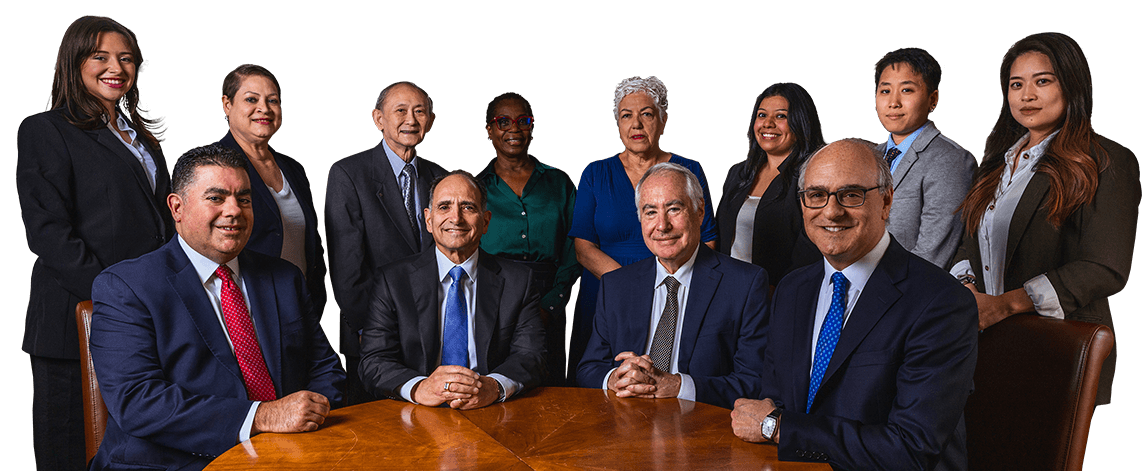Brain Injuries
$50 Million - Christian N
Dansker & Aspromonte Associates LLP Are Experienced & Successful New York Serious Injury Lawyers with Results Exceeding $750 Million

$31 Million
See More Case Results

Trusted New York Traumatic Brain Injury Lawyers
Your brain is the most important organ in your body. It acts as the control center for all of the voluntary and involuntary actions in which your mind and body engage. When damaged, the consequences can be devastating. Depending on the type and severity of the injury, you may suffer adverse effects for days, months, years, or even permanently. When injured due to another party’s negligent, careless, or even deliberate actions, the burdens associated with such a serious injury should not be yours to carry alone. Fortunately, personal injury laws have been established to protect you in such circumstances.
If you or someone you love has suffered a traumatic brain injury in the greater New York area, you can turn to Dansker & Aspromonte Associates LLP for trusted and proven legal help. Our firm has been representing personal injury clients since 1986. We are a team that works like a family and treats you like family when under our care. We are small enough to make personalized client attention a definitive priority while earning a reputation for being a hard-hitting litigation firm. Our team brings 100+ years of experience to your case. Because we prepare all cases for trial, the other side knows that we mean business and will aggressively pursue optimum compensation for our clients.
Contact Dansker & Aspromonte Associates LLP to schedule a free initial consultation with a New York traumatic brain injury attorney by calling us at (212) 732-2929.
What Are Traumatic Brain Injuries?
Traumatic brain injuries (TBIs) are damage to the brain as the result of blunt force impact or penetration of the skull. Damage to the brain can be caused by resulting brain swelling and hemorrhages, concussions, or fractured skulls, disrupting the brain’s ability to function. This can lead to temporary or permanent neurological damage, traumatic epilepsy, and other serious debilitating effects. After a severe head injury, you may suffer extensive damage to your quality of life, experience severe pain, and require surgeries, other treatments, or rehabilitation. Medical care for traumatic brain injuries can cause catastrophic medical bills and lost wages.
Open & Closed Brain Injuries
TBIs can be classified as open or closed. Closed-head injuries stem from the brain violently striking the skull wall when hit or from physical wounds to the head. Open-head brain injuries occur when the skull bones are fractured or broken causing damage to the brain’s soft tissue underneath.
Examples of TBIs that our attorneys have handled include:
- Concussions. These are minor injuries caused by the head or brain being shaken or from suffering blunt force trauma.
- Contusions. Traumatic force bruises the brain’s soft tissue; this causes leaking of the small blood vessels that create pressure in the skull.
- Penetrating brain injuries. When an object pierces the skull reaching the brain, it can cause extensive neurological damage.
- Anoxic injuries. These are caused by a lack of oxygen to the brain. Brain cells then die resulting in traumatic brain damage.
Even if you believe you have suffered only a minor concussion, you should always take any brain injury seriously. Effects may not manifest immediately and damage can be more severe than you understand. Ensuring you have proper medical attention in the aftermath of any blow to the head is essential.
How a Traumatic Brain Injury Can Affect Your Life
The temporary or permanent effects of a brain injury can vary from person to person, depending on the injury’s circumstances and severity.
These effects can include but are not limited to:
- Memory loss
- Mood swings
- Tremors
- Vision impairment
- Coma
- Cognitive impairment, such as in reasoning, problem-solving, learning disabilities, and more
- Personality changes
- Seizures
- Speech problems
- Paralysis
- Mobility impairment
- Depression, PTSD, and anxiety
These types of disabilities can totally disrupt your life, impair your ability to work and remain self-supporting, and require personal at-home assistance. Lack of income and spiraling expenses can lead to financial ruin without the resources needed to meet the demands of such a serious injury.
Recovering from a TBI
Recovery from a traumatic brain injury (TBI) involves a comprehensive approach that often includes medical treatment, rehabilitation, and support. Here’s a breakdown of the treatment involved:
- Emergency Medical Care: Immediate medical attention is crucial to stabilize the patient and prevent further damage. This may involve procedures to control bleeding, ensure proper oxygen supply, and stabilize blood pressure.
- Diagnostic Tests: After stabilizing the patient, diagnostic tests such as CT scans or MRI scans are conducted to assess the extent and location of the injury.
- Medication: Depending on the specific symptoms and complications, various medications may be prescribed. These can include pain relievers, anti-seizure drugs, medications to reduce intracranial pressure, and antidepressants or anti-anxiety medications to address emotional or behavioral changes.
- Surgery: In cases where there is significant bleeding, swelling, or damage to the brain tissue, surgery may be necessary to remove clots, repair skull fractures, or relieve pressure on the brain.
- Rehabilitation Therapy: Rehabilitation plays a vital role in helping individuals regain lost skills and adapt to any permanent changes resulting from the injury. This can include:
- Physical Therapy: Helps improve strength, coordination, balance, and mobility.
- Occupational Therapy: Focuses on regaining the ability to perform daily tasks such as dressing, cooking, and writing.
- Speech and Language Therapy: Aims to improve communication skills, speech, and language comprehension.
- Cognitive Rehabilitation: Helps address memory, attention, problem-solving, and other cognitive impairments.
- Psychological Therapy: Provides support for emotional and psychological issues such as depression, anxiety, and adjustment to disability.
- Assistive Devices: Depending on the individual’s needs, various assistive devices such as mobility aids, communication devices, and memory aids may be recommended to improve independence and quality of life.
- Long-Term Monitoring and Support: Recovery from a traumatic brain injury can be a lengthy process, and ongoing monitoring and support are essential. This may involve regular medical follow-ups, adjustments to treatment plans, and access to support groups or counseling services.
- Lifestyle Modifications: Adopting a healthy lifestyle can also support recovery. This includes getting adequate rest, eating a balanced diet, avoiding alcohol and drugs, and engaging in activities that promote brain health, such as physical exercise and cognitive stimulation.
Every traumatic brain injury is unique, and the treatment plan is tailored to the individual’s specific needs, the severity of the injury, and any associated complications. Patients and their families need to work closely with healthcare professionals to ensure the best possible outcomes.
Recover Your Life
Let Us Fight For You Free & Confidential Consultation
Unfortunately, based on your query, we are unable to assist you at this time. Our firm specializes in serious accidents and negligence cases, such as car accidents, slips and falls, construction accidents, and other accidents that require hospitalization or ongoing treatment.
How We Can Help
How a Traumatic Brain Injury Can Affect Your Life
These effects can include but are not limited to:
The temporary or permanent effects of a brain injury can vary from person to person, depending on the injury’s circumstances and severity.
- Memory loss
- Mood swings
- Tremors
- Vision impairment
- Coma
- Cognitive impairment, such as in reasoning, problem-solving, learning disabilities, and more
- Personality changes
- Seizures
- Speech problems
- Paralysis
- Mobility impairment
- Depression, PTSD, and anxiety
These types of disabilities can totally disrupt your life, impair your ability to work and remain self-supporting, and require personal at-home assistance. Lack of income and spiraling expenses can lead to financial ruin without the resources needed to meet the demands of such a serious injury.
Recovering from a TBI
Recovery from a traumatic brain injury (TBI) involves a comprehensive approach that often includes medical treatment, rehabilitation, and support. Here’s a breakdown of the treatment involved:
- Emergency Medical Care: Immediate medical attention is crucial to stabilize the patient and prevent further damage. This may involve procedures to control bleeding, ensure proper oxygen supply, and stabilize blood pressure.
- Diagnostic Tests: After stabilizing the patient, diagnostic tests such as CT scans or MRI scans are conducted to assess the extent and location of the injury.
- Medication: Depending on the specific symptoms and complications, various medications may be prescribed. These can include pain relievers, anti-seizure drugs, medications to reduce intracranial pressure, and antidepressants or anti-anxiety medications to address emotional or behavioral changes.
- Surgery: In cases where there is significant bleeding, swelling, or damage to the brain tissue, surgery may be necessary to remove clots, repair skull fractures, or relieve pressure on the brain.
- Rehabilitation Therapy: Rehabilitation plays a vital role in helping individuals regain lost skills and adapt to any permanent changes resulting from the injury. This can include:
- Physical Therapy: Helps improve strength, coordination, balance, and mobility.
- Occupational Therapy: Focuses on regaining the ability to perform daily tasks such as dressing, cooking, and writing.
- Speech and Language Therapy: Aims to improve communication skills, speech, and language comprehension.
- Cognitive Rehabilitation: Helps address memory, attention, problem-solving, and other cognitive impairments.
- Psychological Therapy: Provides support for emotional and psychological issues such as depression, anxiety, and adjustment to disability.
- Assistive Devices: Depending on the individual’s needs, various assistive devices such as mobility aids, communication devices, and memory aids may be recommended to improve independence and quality of life.
- Long-Term Monitoring and Support: Recovery from a traumatic brain injury can be a lengthy process, and ongoing monitoring and support are essential. This may involve regular medical follow-ups, adjustments to treatment plans, and access to support groups or counseling services.
- Lifestyle Modifications: Adopting a healthy lifestyle can also support recovery. This includes getting adequate rest, eating a balanced diet, avoiding alcohol and drugs, and engaging in activities that promote brain health, such as physical exercise and cognitive stimulation.
Every traumatic brain injury is unique, and the treatment plan is tailored to the individual’s specific needs, the severity of the injury, and any associated complications. Patients and their families need to work closely with healthcare professionals to ensure the best possible outcomes.
Hold At-Fault Parties Accountable for Your Losses
Dansker & Aspromonte Associates LLP is here to help you hold at-fault parties accountable for the losses you have sustained. Our New York traumatic injury lawyers are here to help, backed by decades of fighting for injury victims.
Call us today at (212) 732-2929 to learn more about your case and options in a free evaluation. You pay nothing unless we win your case.
Causes of Traumatic Brain Injuries
TBIs can occur in anyone. According to the Brain Injury Association of New York State, an average of 48,357 children under 19 visit the emergency room for a traumatic brain injury every year. The majority of TBIs in children result from sports and recreational activities.
For New York adults, TBIs are frequently caused by:
- Bike and pedestrian accidents
- Slip and falls
- Brain injuries
- Physical violence
- Workplace incidents (including construction accidents)
The team at our injury law firm has experience handling TBI cases involving clients of all ages, from infants to those over 65. If a negligent party caused your trauma, we can fight for fair and reasonable compensation for your damages.
How We Fight for You in Traumatic Brain Injury Cases
Sorting out your finances while working to overcome a brain injury can be overwhelming. However, with a qualified New York traumatic brain injury attorney on your side, you can pursue fair compensation to recover all of your physical, emotional, and economic losses.
When we agree to accept cases, this is what we do:
- Walk you through the civil litigation process and help you understand your legal options
- Evaluate your accident to identify the at-fault party (or parties)
- Consult with your doctors
- Gather all employment or lost wages information, if applicable
- Present your case in front of a jury at trial in court, if necessary
- Collect and preserve evidence, such as witness testimonies, medical records, and accident reports
- Demand sworn statements from all at-fault parties
- Retain experts to support your claim
- Negotiate for a fair and reasonable settlement from the liable party
Our attorneys bring extensive experience to a range of personal injury cases, including car and construction accidents, catastrophic injuries, wrongful death, and more.
Stay in the Know
Read Our Brain Injury Blog

Handle Your Case With Confidence
We serve clients throughout the New York City Metropolitan area, including Manhattan, Brooklyn, the Bronx, Queens, Staten Island,
and Nassau and Suffolk Counties. Contact us for help today.





